OWU senior ponders ‘development’ goals in Ecuador
November 23rd, 2021 | SIT Study Abroad
This story is reprinted with permission from Ohio Wesleyan University.
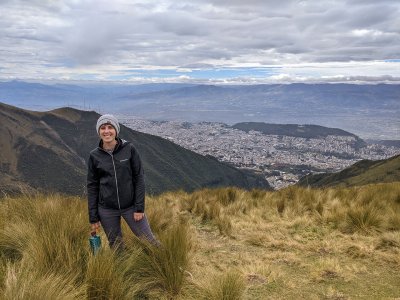
(Photos courtesy of Meg Edwards)
Name: Meg Edwards ’22
Hometown: Columbus, Ohio
Major: International Studies and Spanish
Experience: SIT Ecuador: Development, Politics, and Languages
By Cole Hatcher
During her semester in Ecuador, Meg Edwards participated in a variety of learning experiences including in-classroom lectures on the Ecuadorian political context, research methods/ethics, Kichwa language, and a two-week intensive Spanish course. She also participated in excursions to different parts of the country and completed a month-long independent study project that included independent field work.
This program has caused me to reflect a lot on what exactly the goal of ‘development’ is, on what changes I actually want to make in the world, and how one should go about making change.
Why I Chose Ecuador
“The words ‘development, politics, and languages’ essentially sum up my academic interests. More importantly though, I was excited that SIT offered a host-family component (unfortunately canceled due to the pandemic) and the independent study project (ISP), which provides an opportunity to practice field work and truly immerse oneself in the Ecuadorian context. That, and Ecuador is an incredible country in which to study sustainable development due to its extremely rich biodiversity and unique environmental history.”
My Favorite Moment
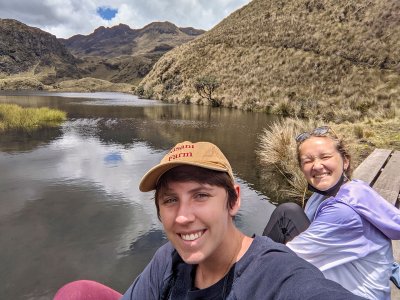
“There have been many remarkable moments but the first to come to mind is during our excursion to the Galapagos when we climbed the volcano, Sierra Negra, which created the island of Isabela.
The independent study project (ISP) ... provides an opportunity to practice field work and truly immerse oneself in the Ecuadorian context.
“One of the remarkable things about the Galapagos is how one can see the process of evolution happening in real time and witness the difference between the dry volcanic beaches, the rich tropical highlands, and the bare, brand-new volcanic rock around the crater: completely different biomes that exist within a few kilometers of each other on each island.
“You don’t have to be an ecologist there to recognize the importance of topsoil to support life and the complexity and fragility of all ecosystems.”
Lessons Learned
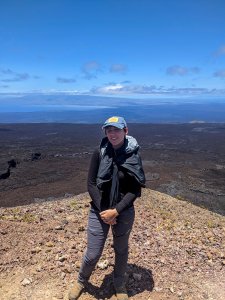
“This program has caused me to reflect a lot on what exactly the goal of ‘development’ is, on what changes I actually want to make in the world, and how one should go about making change. We talk a lot about post-development alternatives and the unintentional harm that can be caused by development efforts, which is extremely important to consider as I continue studying and look for work in my field.
Oftentimes, well-meaning students from the U.S. imagine that the whole world ought to live like we do, and that is what development means. In this program, I have learned more about locally driven development and the many different ways of life around the world.
“For example, recently we went on an excursion to stay in the Intag Zone in the province of Imbabura, which is a highly biodiverse cloud forest home to several agricultural communities, and also the target of mining concessions. These communities are actively resisting being displaced by copper mining companies, and we spoke to a few community leaders about their efforts to strengthen the community by developing ecotourism and organizing collectives to sell artisan crafts. I am excited to continue learning about these alternative forms of development during my Independent Study Project.
‘Life Around the World’
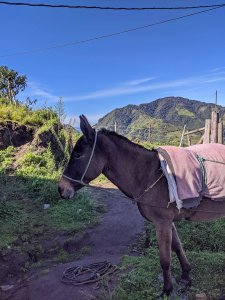
“These experiences in rural communities have been impactful because they help me relativize the ideas of poverty and development and understand the complexity of life in different cultural and political contexts. Oftentimes, well-meaning students from the U.S. imagine that the whole world ought to live like we do, and that is what development means. In this program, I have learned more about locally driven development and the many different ways of life around the world.
“I didn't know it at the time, but an independent study with Dr. Alper Yalçinkaya, in which we discussed the causes of global inequality and the sociology of global development, has been very useful during this program.”
Another Meaningful ‘OWU Connection’

“Last summer I traveled around the United States using a Theory-to-Practice Grant and interviewed 16 farmers about their perspectives on agricultural policy, environmental regulation, and changes in the agricultural industry. This was an opportunity for me, a student from the suburbs with an interest in sustainable agriculture, to learn about the industry from farmers themselves. I also wanted to amplify the voices of individual farmers who are often excluded from policy discussions.
“I compiled information from the interviews into a storymap, which is currently posted on my personal website. I would love to share these farmers’ stories more widely, and anyone interested in publishing it or about it should contact me.”
Why I Chose Ohio Wesleyan
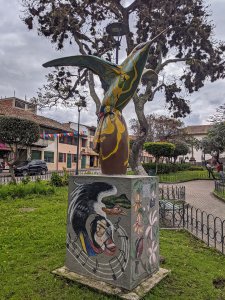
“I chose OWU because I was impressed by the diversity of options for travel: Travel-Learning Courses, study abroad, and Theory-to-Practice Grants, and because I felt very welcomed when visiting campus. I’m very grateful that even with the disruption of the pandemic, I will graduate having traveled to multiple countries and completed independent research.”
I would like to contribute to efforts to adapt to and mitigate climate change through public policy ...
My Plans After Graduation
“I do not have any specific post-graduation plans. I would like to contribute to efforts to adapt to and mitigate climate change through public policy, be that with a nonprofit organization or in government. Ohio Wesleyan has provided me with opportunities to explore and define what it is I want to do and what is important to me.”
